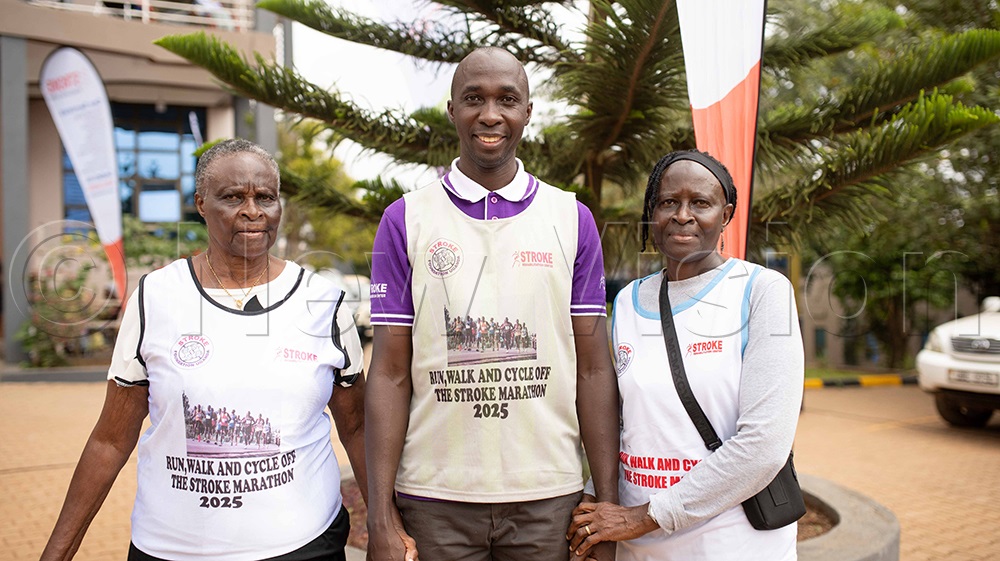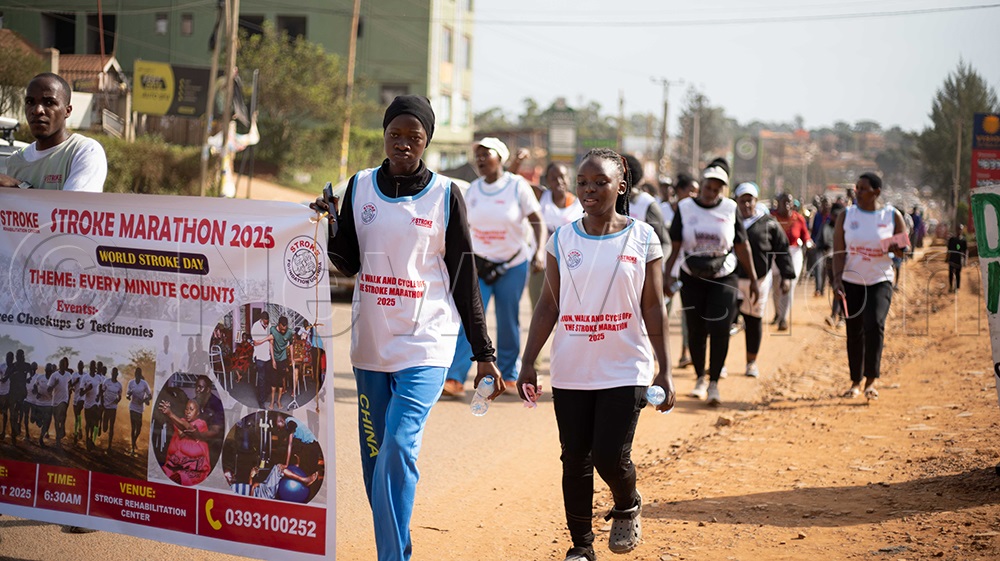'Prevent stroke through regular medical check-ups, exercises'
A stroke is a medical emergency that occurs when blood flow to a part of the brain is interrupted, causing brain cells to die from a lack of oxygen. This can happen due to a blood clot blocking an artery or a blood vessel rupturing and bleeding into the brain.
A fitness coach conducting aerobics at Stroke Rehabilitation Centre on Wampewo. (Credit: Agnes Kyotalengerire)
__________________
The Stroke Rehabilitation Centre, Wampewo in Wakiso district has admitted close to 30 new stroke patients, with the majority being young people aged between 25 and 40, this October alone, New Vision Online has learnt.
Health experts say these cases are partially driven by failure to regularly check blood pressure, sugar, and exercise regularly to prevent stroke.
A stroke is a medical emergency that occurs when blood flow to a part of the brain is interrupted, causing brain cells to die from a lack of oxygen. This can happen due to a blood clot blocking an artery or a blood vessel rupturing and bleeding into the brain.
Principal Senior Physiotherapist at the Wampewo-based Stroke Rehabilitation Centre, Ibrahim Bukenya, says non-communicable diseases have increased in Uganda, accounting for 87% of all diseases, with stroke taking the second position.
The Principal Senior Physiotherapist at Stroke Rehabilitation Centre in Wampewo Gayaza a city suburb, Ibrahim Bukenya, poses for a photo with stroke survivors. (Credit: Agnes Kyotalengerire)
He says it is hard to tell when one will get a stroke. However, if they are hypertensive or diabetic, checking the test results can show that blood pressure or sugar levels are elevated, which requires health workers to administer medication immediately.
He further noted that engaging in exercise regularly increases physical fitness, helps in the reduction of cholesterol (fats that clog the veins), in the sense that the excess lipids in the vessels are broken down. It also increases the strength of the heart, increases oxygen circulation in the body as well and relieves joint pain.
Bukenya was speaking during a Marathon to mark World Stroke Day on October 25, 2025, under the theme: Every minute counts. The activity that was organised by the centre attracted children, adults and survivors of stroke.
Every October 29, Uganda joins the rest of the globe to commemorate World Stroke Day to raise awareness about the health condition.

Participants taking part in the marathon in Wampewo to mark the World Stroke Day. (Credit: Agnes Kyotalengerire)
Steer clear of stress
The head of programme at the Uganda Non-Communicable Diseases Alliance (UNCDA), Christopher Kwizera, advised the public to avoid things that cause them stress.
"For instance, why would you take your children to a school with a fee structure of shillings two million when you earn less? Kwizera said, adding: Make sure you do what is within your means to avoid stressful moments.
He also emphasised the importance of ensuring healthy diets packed with fruits, vegetables while avoiding fatty, sugary foods, excessive alcohol intake and smoking.
The patron of the Old is Gold Association in Wampewo, Sitenda Sebalu, advised the public to take care and support stroke patients, noting that the health condition is treatable.
“After developing a stroke, it can be treated and you become productive to your family and the entire nation,” he noted.
The burden
Although local data on the prevalence of stroke in Uganda is scanty, the health condition is a major health burden, ranking as a top cause of adult death and accounting for a significant portion of hospital admissions.
Understanding stroke
Dr Joel Kiryabwiire, a neurosurgeon at Mulago Hospital, says stroke may result from blockage of a clot in a blood vessel, cutting off blood supply to the brain, a medical condition referred to as Ischemic stroke. This type of stroke accounts for up to 87% of all strokes.
“When the blood supply is cut off, the brain cells become damaged, making the part of the body controlled by the affected brain area lose function or even the entire side of the body,” Kiryabwiire said.
In some other cases, stroke may occur when a blood vessel suddenly bursts due to increased blood pressure or because the vessel is narrow and weak. Consequently, blood spills into the brain, causing damage to the brain cells. As such, the affected part of the brain stops functioning, a condition medically referred to as hemorrhagic stroke.
According to Kiryabwiire, about 75% of the patients they admit at Mulago hospital have a history of poorly managed high blood pressure, kidney diseases and diabetes. The sudden rise in blood pressure causes the blood vessels to burst.
He said before the stroke, there is a tendency to have a severe or splitting headache which does not respond to medication, together with poor vision.